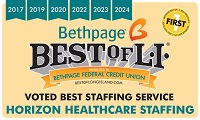5 Supplemental Education Courses Required for Healthcare Jobs
Building on your education has been a part of the healthcare profession as long as I can remember. As a nurse, I have learned that each facility or organization has its own set of requirements for practitioners.
These five courses/tests generally are required for all healthcare professionals prior to being placed into a position:
BLS/CPR
Basic Life Support Class or better known as a CPR class
This class offers training in various techniques for crisis with a patient with cardiac arrest, breathing difficulty and even choking from infants to adults. There are many different types of classes offered. Our clients generally request American Heart Association or Red Cross administered certifications. Remember to NOT take these initial classes online as you will not have the opportunity to perform the practical tasks required (chest compressions and breathing etc.) Please gain the advice of your recruiter prior to taking a class to confirm it is the correct one.
ACLS
Advanced Cardiovascular Life Support
An ACLS certification is required for registered nurses when being placed within an acute care facility or ambulatory care facility. Most of the units now are requesting the nurses take the ACLS course and be trained in Advanced Cardiovascular Life Support. I have seen the facilities with a higher volume of acute care patients ask for ACLS prior to being placed on a Medical Surgical unit. When I worked in the hospital setting, the only departments that used to ask for it were the Emergency Departments and the Intensive Care Units. Today even the Labor and Delivery Departments are requiring the certification.
PALS
Pediatric Advanced Life Support
A PALS certification is required for registered nurses when being placed within an acute care facility or ambulatory care facility monitoring pediatric patients. Most of the pediatric units now are requesting the nurses take the PALS course and be trained in Pediatric Advance Life Support . The Emergency Departments have always asked for this and special pediatric care units also require it.
NRP
Neonatal Resuscitation Program
A NRP certification is required for registered nurses when being placed within a specialty area called Maternal Child Health. Emergency Departments have also requested this certification as well. Most of the MCH units now are requesting the nurses take the NRP course and be trained in the Neonatal Resuscitation Program. This specialized training is required to develop and maintain safe practices when working with infants. The PALS course can offer training with infants too but NRP is very specific to neonates.
FIT Test
Respiratory FIT Test
The FIT Test certification is required to fit you for a special mask. This allows you to be protected from patients who have been diagnosed with Tuberculosis. This will protect you so you will not be exposed to this disease.
In today’s job market, with more and more people searching for a position, you MUST stand out. Having these courses/tests completed will make your credentialing process smoother which will help for a faster placement! There are no guarantees of a job, but compliance with the requested documents help us market you more effectively.



These are great certifications for all RNs to have. Lately, almost all Registered Nurse openings in hospitals are requiring BLS and ACLS as well. The FIT test is mandatory for any candidate who will have patient contact. We offer this course for free in our office to any candidate who is pending hospital placement !
Two other great courses that were not mentioned in this article are TNCC and CNOR. TNCC is the Trauma Nursing Core Course and teaches RNs how to be experts in dealing with trauma patients. This is a very popular credential I see with many ICU/CCU and ED RNs. The CNOR Certification is a very recognizable credential for prerioperative Nurses. Those who carry it are highly distinguished in the operating room community.
ACLS and PALS are both so important for school nursing because you can potentially be dealing with emergencies in both the adult and pediatric population. Fit testing is also important, especially with airborne precautions, it is good to know and have that testing already complete
I’ve never heard of any of these certifications before. The only one I knew about is CPR which I think everyone should learn. Learning these certifications can only help you further your career. The fact that Horizon can offer some for free is no excuse for anyone to learn them. It could very well not only save a life but you could save your own life in the process. Prevention is key. Knowledge is power!